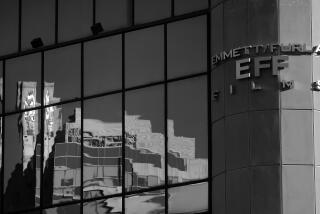TCW’s plan to fire exec disputed
TCW Group Inc. was working on a plan to oust executive Jeffrey Gundlach in the summer of 2009, well before the firm said it had formally decided that he would be fired, his attorneys sought to show a jury in TCW’s court battle with its ex-star bond fund manager.
In cross-examination by Gundlach’s attorneys Wednesday, TCW Group Chief Executive Marc Stern was asked about “Project G,” the code name top executives at the Los Angeles money management giant used in discussing their conflicts with Gundlach and how to resolve them.
The jury was shown an email that Stern sent Aug. 1, 2009, to Jean-Pierre Mustier, an executive at Societe Generale, the French bank that owns TCW. Stern told Mustier that he was “not optimistic” about reaching an accommodation with Gundlach, and that “we may have to move to Plan B.”
Stern insisted in court that “Plan B” was “not specifically” about firing Gundlach. But on Aug. 27, Stern and other TCW executives met to discuss Project G, according to hand-written notes shown to the jury.
One of the notes said, “Unfortunately, we’ve had to terminate JG [Jeffrey Gundlach] for cause.” Gundlach’s attorney, Brad Brian, asked Stern whether that note indicated that “someone was sketching out a press release” about Gundlach’s termination.
“No,” Stern answered.
The timing could be critical in the case as jurors weigh whether TCW fired Gundlach in reaction to alleged threats he had made to abandon the firm, or whether TCW had been actively seeking to push him out.
TCW, which manages about $120 billion in assets, fired Gundlach in December 2009 in a shakeup that rocked the mutual fund world. One month later the company sued Gundlach in L.A. County Superior Court. TCW alleges that he and key aides conspired against the firm and stole massive amounts of TCW proprietary information to set up a rival firm, DoubleLine Capital, almost overnight.
Gundlach, 51, countersued, accusing TCW and Societe Generale of firing him after 24 years at the firm to cheat him out of a huge chunk of promised income. He denies using any TCW proprietary information to create DoubleLine, which now manages $14 billion.
Each side is seeking hundreds of millions of dollars in damages from the other.
In testimony last week, Stern said he decided to oust Gundlach only because the company was “in the process of being destroyed” by internal strife fomented by the fund manager.
Because of Gundlach’s stellar record managing TCW’s bond funds, which made up most of the firm’s assets, firing him “would be like cutting off your right arm,” Stern had testified.
Gundlach has said that he opposed Societe Generale’s decision in June 2009 to bring Stern back as head of the company, after then-CEO Robert Beyer resigned. Stern, 66, had retired as president of TCW in 2005.
Company emails have shown that other top TCW fund managers also were against Stern’s return. But Gundlach’s attorneys sought to show jurors Wednesday that Stern treated Gundlach differently.
In an email to Mustier on June 1, 2009, Stern wrote: “His majesty, King Jeffrey, has consented to grant me an audience tomorrow morning at 10 a.m. All hail.”
Brian asked Stern whether he was mocking Gundlach. “I really was not,” Stern said.
Gundlach, who earned $40 million in 2009, alleges that TCW and Societe Generale believed they could save huge sums of money by firing him if they also could persuade most of his team members to stay. But nearly all of them bolted to join him at DoubleLine.
On the same day that TCW ousted Gundlach the firm bought another L.A. bond fund manager, Metropolitan West Asset Management, to take over for him.
Brian showed jurors a report Stern sent to Societe Generale in October 2009 estimating that TCW could save $50 million a year by replacing Gundlach with Met West. Stern said that figure was “based on certain assumptions.”
Brian also told jurors that TCW was negotiating with the U.S. Treasury in summer 2009 for a new fund that Gundlach would manage for the government under its bank-bailout plan.
Under questioning, Stern said that TCW had not notified the Treasury at the time that the company was concerned that Gundlach might leave, or that it was considering whether to fire him.
More to Read
Inside the business of entertainment
The Wide Shot brings you news, analysis and insights on everything from streaming wars to production — and what it all means for the future.
You may occasionally receive promotional content from the Los Angeles Times.










